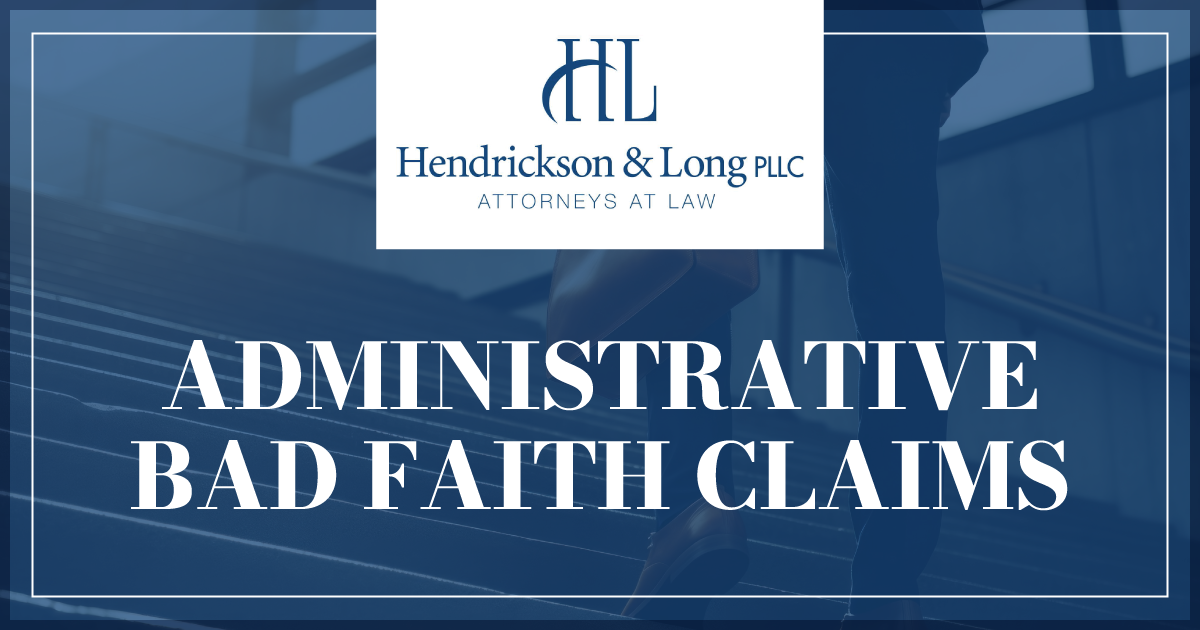Bad Faith Claims in West Virginia
In our role as insurance defense litigators in Charleston, we regularly handle bad faith insurance claims on behalf of insurance companies and self-insured corporations.
We see this work as critically important given how these secondary claims can lead to businesses like yours facing additional liability exposure, which, if not resolved in your favor, can lead to your company facing regulatory compliance issues and having to make additional financial payouts.
Our attorneys have extensive experience handling administrative bad faith claims in West Virginia and can aggressively defend your company in potentially costly legal matters like these.
Types of Bad Faith Allegations Our Legal Team Defends Against
During the several decades since our firm’s inception, our insurance defense attorneys have had the pleasure of standing up to claimants who have alleged that their company has done the following in handling problematic claims:
- Did not investigate submitted claims thoroughly, including ignoring critical evidence
- Didn’t acknowledge receipt of or render approval or denials in a timely fashion
- Constantly requested additional documentation to support a claim even though they already have enough to do so
- Failed to give a legally sound or adequate reason for a claim denial
- Remitted less of a payout than what a claimant was entitled to per policy documents
- Harassed claimants
- Dragged their feet in remitting a payment of benefits due
Insurers We Represent
We represent insurance agents and brokers as well as others facing bad faith claims associated with the following coverage:
- Life and health insurance
- Professional liability carriers, like medical malpractice ones
- Motor vehicle insurers
- Casualty insurance companies
- Disability insurers
- Errors & omissions insurance companies
- Workers’ comp insurance
- Personal injury liability carriers, including product liability ones
- Flood insurance companies
- Many other insurers
A Plaintiff’s Burden of Proof
The responsibility falls on claimants to prove that an insurer or self-insured party acted “unreasonably,” which generally means that they acted dishonestly or fraudulently on purpose.
It’s not unheard of for a plaintiff to be able to provide evidence of claim submissions or insufficient follow-up on behalf of insurers, or to demonstrate an insurance company’s failure to comply with the terms of their policy.
However, doing so rarely results in a favorable outcome, especially when entities like yours work closely with an attorney practiced in corporate defense.
And, no matter if you or your company are facing concerns similar to those listed above, or any others, know that our experienced litigators are thoroughly knowledgeable about insurance law and its applicability in a wide range of bad faith cases insurance carriers face.
Understanding Legal Remedies for West Virginia Bad Faith Cases
In 2005, the 77th West Virginia Legislature passed a tort reform doing away with third-party bad faith actions. This left the sole legal remedies being either the filing of first-party claims or the submission of an administrative complaint to the West Virginia Insurance Commission.
This prompts the commission to launch an investigation and hold an administrative hearing, when appropriate, to determine whether a self-insured company or insurer engaged in bad faith practices and, if so, which penalties they should face for doing so.
These hearings or ensuing lawsuits can result in insurers facing disciplinary action, including a judgment being entered to compensate the plaintiff for the harm they suffered, as well as the imposition of punitive damages.
We’re eager to represent you in defending your company when coverage or other bad faith insurance disputes arise, including representing your best interests at administrative hearings.
Contact our law firm, Hendrickson & Long, PLLC, to discuss the violations of insurance law you or your company stands accused of. We’ll put you in contact with an attorney well-versed in handling administrative bad faith claims in West Virginia.


